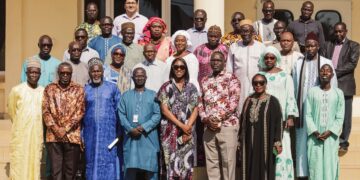Ngũgĩ wa Thiong’o, the distinguished Kenyan writer, scholar, and public intellectual, has passed away at the age of 87 EduTimes Africa Reports.
His daughter, fellow writer Wanjiku wa Ngugi, made the announcement on Wednesday morning via a Facebook post. “It is with a heavy heart that we announce the passing of our dad, Ngũgĩ wa Thiong’o, this Wednesday morning, 28th May 2025. He lived a full life, fought a good fight. As was his last wish, let’s celebrate his life and his work. Rîa ratha na rîa thŭa. Tŭrî aira!”
The family spokesperson, Nducu wa Ngugi, is expected to release further details regarding the celebration of his life in due course.
Born on 5 January 1938 in Kamiriithu, Kenya, during the era of British colonial rule, Ngũgĩ’s early experiences of political turbulence and social change profoundly shaped his worldview and literary voice. He became one of Africa’s most influential literary figures, known for his relentless advocacy for decolonisation, indigenous language preservation, and educational reform.
Ngũgĩ’s literary career began with Weep Not, Child (1964), recognised as one of the first novels in English published by a writer from East Africa. His subsequent works – including The River Between (1965), A Grain of Wheat (1967), Petals of Blood (1977), and Devil on the Cross (1980) – are widely taught in African literature, post-colonial studies, and history classrooms across the globe. These works explored themes of colonial resistance, cultural erosion, betrayal, and national identity.
A trailblazer in linguistic decolonisation, Ngũgĩ famously chose to write in his native Kikuyu language from the 1980s onward, challenging the dominance of colonial languages in African literature and academic discourse. His commitment to linguistic justice was both a literary and political act, especially evident in Decolonising the Mind (1986), a seminal work that has become required reading in universities worldwide.
His political activism led to his arrest and detention without trial by the Kenyan government in 1977 following the staging of a politically charged play. Upon his release, he lived in self-imposed exile, where he continued to write, teach, and advocate for social justice and academic freedom.
Ngũgĩ held academic positions at leading institutions, including Yale University and the University of California, Irvine, where he was a Distinguished Professor of English and Comparative Literature. He inspired generations of students and scholars through his teaching, lectures, and prolific writing.
Tributes are pouring in from across the literary and academic worlds, honouring a man whose voice and vision transformed how Africa is studied, narrated, and understood.
Ngũgĩ wa Thiong’o leaves behind a towering legacy of intellectual courage, literary brilliance, and a lifelong devotion to education and the empowerment of African voices.



















































































 EduTimes Africa, a product of Education Times Africa, is a magazine publication that aims to lend its support to close the yawning gap in Africa's educational development.
EduTimes Africa, a product of Education Times Africa, is a magazine publication that aims to lend its support to close the yawning gap in Africa's educational development.